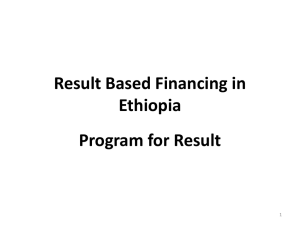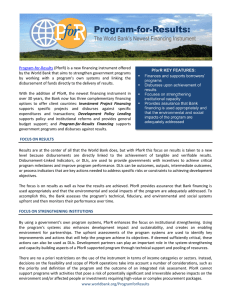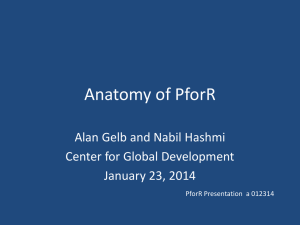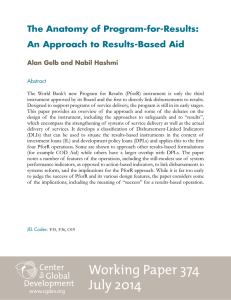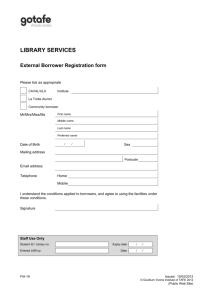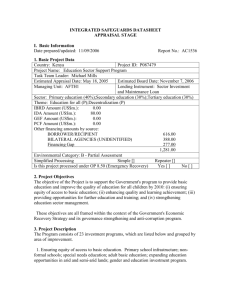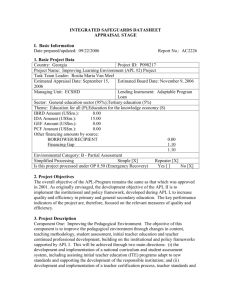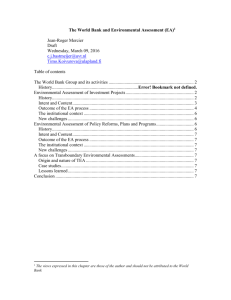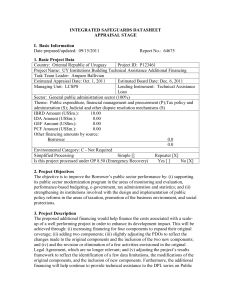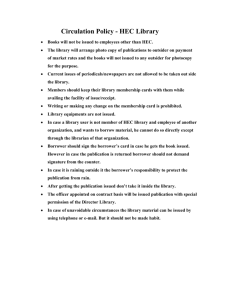Tied to a Government program
advertisement
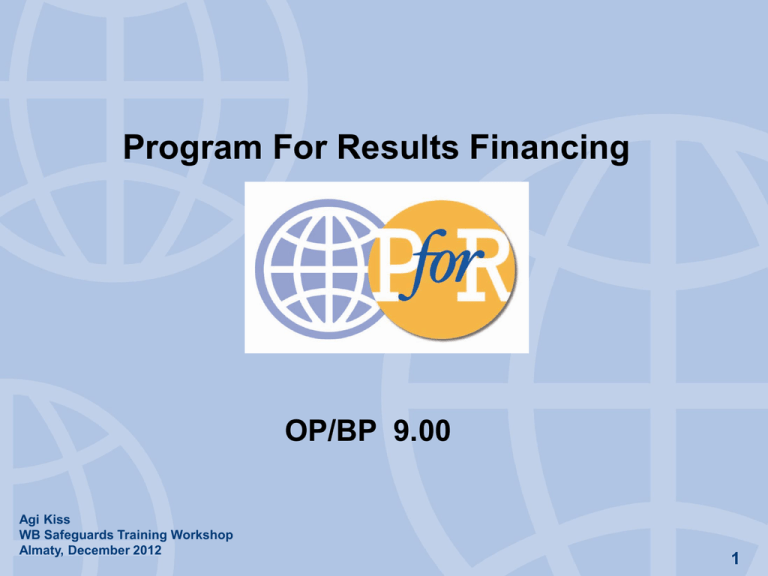
Program For Results Financing OP/BP 9.00 Agi Kiss WB Safeguards Training Workshop Almaty, December 2012 1 Principles and Core Elements of PforR Help governments improve the design and implementation of their programs using program systems WB works with Borrower institutions to strengthen capacity and improve performance of systems over time Directly link achievement of results to disbursement of WB funds Promote transparency and accountability in Government programs 2 How it Works Define the PforR Program: • • • Define the PforRProgram’s development objectives • Tied to a Government program (new or ongoing) sector-wide , sub-sector or multi-sectoral; national, subnational or location-specific; new or ongoing; entire or “time slice” boundaries of the PforR Program establish the scope of WB assessments Develop PforR Program “Results Framework” with clear linkage to objectives of Gov’t program Identify activities included within PforR Program • PforR operation might not include all activities in the Govt’s program 3 How it Works (cont.) WB Task Team assesses: (i) the Government program and proposed PforR Program and (ii) its management systems as they exist and operate within the boundaries of PforR Program WB Team prepares 3 Assessment reports: • • • Technical assessment: strategic relevance, technical soundness, institutional quality, implementation capacity, expenditure framework/effectiveness of expenditures Fiduciary systems assessment: (procurement, financial management/accounting Environmental and social systems assessment 4 How it Works (cont.) Assessment Reports cover: • • • Key risks (within the respective areas) for Program not achieving desired results Recommended actions for managing risks, strengthening institutions, improving systems performance Assessment of “complaints mechanism” for each system The 3 Reports feed into 1 “Integrated Risk Assessment “ Tool for WB Management to: • • accept, modify or reject the proposed PforR Program operation; monitor evolution of Program’s risks during implementation 5 How it Works (cont.) WB and Borrower agree on a Program Action Plan • • • • based on outcome of the 3 Assessments actions for improving technical aspects, strengthening institutions, improving systems selective (limited number), feasible, realistic in timeframe Implementation may be financed as integral part of the PforR Program or separate Technical Assistance project Progress is tracked by WB and Borrower based on specific “Disbursement Linked Indicators” • WB Task Team also monitors performance of systems, implementation of Program, Action Plan, evolution of risks, status/functioning of “complaints mechanisms,” all based on the initial Assessment Reports 6 Basic Principle: Exclusion and Screening for Environmental and Social Risks PforR financial instrument does not support programs or activities that could cause significant harm to the environment or which could have significant adverse social consequences (e.g. power plants, major transport infrastructure, investments in extractive industries, commercial logging). All PforR operation proposals should be screened for such adverse impacts at an early stage If such activities are likely to occur within the program as defined, they should be excluded from PforR support or, if included be subjected to investment lending (i.e., Safeguard Policies). For the remaining PforR Program activities which are not excluded as above… 7 Environmental and Social Systems Assessment Safeguard Policies per se do not apply to PforR Program operations • • OP/BP 9.00 (Program for Results Financing) sets out core principles similar in substance to those set out in the SG policies for standard investment lending Follows a risk management approach (matching process requirements to Program context; assessing adequacy of Borrower systems in relation to nature/significance of Program risks Interim Guidance Note for E & S Systems Assessment provides details on the core principles and “key planning elements” which echo the substance of the Safeguard Policies but without the specific process requirements – what to achieve, not how to do it 8 From Interim Guidance Note – Example 1 Core Principle Key Planning Elements Env. & Social management procedures designed to promote sustainability in project design, avoid/minimize/mitigate adverse impacts, promote informed decision-making relating to the program’s environmental and social effects Program procedures: Operate within an adequate legal and regulatory framework; Incorporate environmental and social assessment good practice (e.g. early screening of potential impacts, consideration of alternatives, assessment of cumulative and trans-boundary effects, clear articulation of institutional responsibilities, responsiveness and accountability through stakeholder consultation, etc.) Absent: specific requirements for preparation of EIA/EMP; classification into Category A/B/C 9 Example 2 Core Principle Key Planning Elements Land acquisition and loss of access to natural resources are managed in a way that avoids or minimizes displacement, and affected people are assisted in improving, or at least restoring, their livelihoods and living standards The Program to be supported: Avoids or minimizes land acquisition and related adverse impacts; Identifies and addresses impacts due to land acquisition or loss of access to natural resources, including those affecting people who lack legal rights to the land/resources; Provides compensation sufficient to purchase replacement assets of equal value, prior to taking of land or restriction of access; Provides supplementary livelihood restoration measures …. Etc. Absent: requirement for a Resettlement Policy Plan or Resettlement Actio n Plan 10 Example 3 Core Principle Key Planning Elements Env. & Social Management procedures designed to protect public and worker safety associated with: (a) construction and/or operation of facilities; (b) exposure to toxic chemicals, hazardous wastes, other dangerous materials; (c) reconstruction or rehabilitation of infrastructure located in hazard prone areas Promotes community , individual, worker safety through safe design, construction, operation & maintenance of physical infrastructure…; Promotes the use of recognized good practice in production, management, transport & disposal of hazardous materials…; Promotes the use of Integrated Pest Management practices… etc. Combines and expands principles of several Safeguard Policies 11 Example 4 Core Principles Key Planning Elements Avoid exacerbating social conflict, especially in fragile states, post-conflict areas, or areas subject to territorial disputes Considers conflict risks, including distributional inequity and cultural sensitivities Greatly broadens scope of attention on social protection and well-being, beyond Safeguard Policies on involuntary resettlement and indigenous peoples 12
